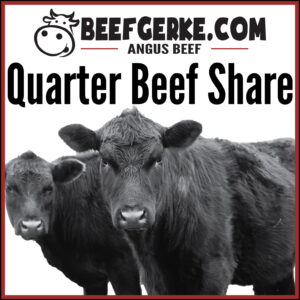Adaptive Farming of Angus Beef

Benefits of Adaptive Farming for Angus Beef Production
Angus beef is a popular and highly sought-after type of beef, known for its marbling, tenderness, and rich flavor. However, producing high-quality Angus beef requires careful and strategic farming practices. In recent years, there has been a growing trend towards adaptive farming in the beef industry, and this approach has proven to be highly beneficial for Angus beef production. Adaptive farming, also known as regenerative farming, is a holistic approach to agriculture that focuses on improving soil health, biodiversity, and overall ecosystem function. This method of farming involves working with nature rather than against it, and it has been gaining traction in the beef industry due to its numerous benefits. One of the main benefits of adaptive farming for Angus beef production is improved soil health. Soil health is crucial for the growth and development of plants, and ultimately, the quality of the beef produced. Adaptive farming practices, such as rotational grazing and cover cropping, help to improve soil structure, increase organic matter, and promote beneficial microorganisms. This results in healthier and more nutrient-dense soil, which in turn leads to healthier and more robust grass for the cattle to graze on. In addition to improving soil health, adaptive farming also helps to increase biodiversity on the farm. Biodiversity refers to the variety of plant and animal species present in an ecosystem. By implementing practices such as rotational grazing, farmers can create a diverse and balanced ecosystem on their land. This not only benefits the environment but also has a positive impact on the health of the cattle. A diverse diet for the cattle leads to better overall health and can even improve the flavor and quality of the beef. Another significant benefit of adaptive farming for Angus beef production is its potential to reduce the need for antibiotics and other medications. In conventional farming, cattle are often given antibiotics as a preventative measure to keep them healthy. However, this practice can lead to the development of antibiotic-resistant bacteria, which can be harmful to both animals and humans. In contrast, adaptive farming focuses on promoting the natural immune system of the cattle through a healthy diet and living conditions. This can reduce the need for antibiotics and other medications, making the beef produced more natural and healthier for consumers. Moreover, adaptive farming can also have a positive impact on the environment. By improving soil health and increasing biodiversity, this method of farming helps to sequester carbon from the atmosphere and reduce greenhouse gas emissions. This is crucial in the fight against climate change, and by choosing to support adaptive farming practices, consumers can contribute to a more sustainable and environmentally friendly food system. In addition to these benefits, adaptive farming can also be financially beneficial for farmers. By reducing the need for expensive inputs such as fertilizers and medications, farmers can save on production costs. Furthermore, by improving soil health and increasing biodiversity, adaptive farming can lead to higher yields and better-quality beef, which can result in higher profits for farmers. In conclusion, adaptive farming has numerous benefits for Angus beef production. From improving soil health and increasing biodiversity to reducing the need for antibiotics and promoting a more sustainable food system, this method of farming has proven to be highly beneficial for both farmers and consumers. By supporting adaptive farming practices, we can ensure the production of high-quality Angus beef while also promoting a healthier and more environmentally friendly food system.Implementing Adaptive Farming Techniques for Sustainable Angus Beef Farming

Angus beef is a popular and highly sought-after type of beef, known for its marbling, tenderness, and rich flavor. However, the traditional methods of farming Angus beef have come under scrutiny in recent years due to their negative impact on the environment and animal welfare. As a result, many farmers are turning to adaptive farming techniques to ensure the sustainability of their Angus beef farms. Adaptive farming is a holistic approach to farming that takes into account the natural environment, animal welfare, and economic sustainability. It involves adapting farming practices to the specific needs and conditions of the farm, rather than following a one-size-fits-all approach. This approach is particularly beneficial for Angus beef farming, as it allows farmers to produce high-quality beef while also minimizing their environmental impact. One of the key aspects of adaptive farming for Angus beef is the use of rotational grazing. This involves dividing the pasture into smaller sections and rotating the cattle between them. This allows the grass to recover and regrow, ensuring a continuous supply of fresh and nutritious forage for the cattle. It also prevents overgrazing, which can lead to soil erosion and degradation. Additionally, rotational grazing mimics the natural grazing patterns of wild herbivores, promoting a healthier and more diverse ecosystem on the farm. Another important aspect of adaptive farming for Angus beef is the use of cover crops. Cover crops are plants that are grown specifically to improve soil health and fertility. They are planted in between grazing periods and help to prevent soil erosion, increase organic matter, and provide additional forage for the cattle. Cover crops also help to reduce the need for chemical fertilizers, making the farm more environmentally friendly. In addition to these farming practices, adaptive farmers also prioritize animal welfare. This includes providing ample space for the cattle to roam and graze, as well as access to clean water and shelter. It also involves using low-stress handling techniques, which not only improve the well-being of the animals but also result in better-quality beef. By prioritizing animal welfare, adaptive farmers are not only producing healthier and happier animals, but they are also creating a more sustainable and ethical farming system. One of the main benefits of adaptive farming for Angus beef is its positive impact on the environment. By using rotational grazing and cover crops, farmers can improve soil health, reduce erosion, and promote biodiversity on their farms. This, in turn, helps to mitigate the effects of climate change and create a more resilient ecosystem. Additionally, by reducing the use of chemical fertilizers and pesticides, adaptive farming helps to protect water sources and reduce pollution. Moreover, adaptive farming also has economic benefits for farmers. By implementing sustainable practices, farmers can reduce their input costs, such as feed and fertilizers. This can lead to higher profits and a more financially stable farm. Additionally, the demand for sustainable and ethically produced beef is on the rise, and adaptive farmers are well-positioned to meet this demand. By marketing their beef as sustainably produced, they can attract a premium price and increase their profitability. In conclusion, adaptive farming is a crucial aspect of sustainable Angus beef farming. By implementing practices such as rotational grazing, cover crops, and prioritizing animal welfare, farmers can produce high-quality beef while also protecting the environment and promoting economic sustainability. As consumers become more conscious of the impact of their food choices, the demand for sustainably produced beef will only continue to grow. Therefore, it is essential for Angus beef farmers to embrace adaptive farming techniques to ensure the long-term viability of their farms.
Maximizing Profits through Adaptive Farming Practices in Angus Beef Production
Angus beef is a popular and highly sought-after type of beef, known for its marbling, tenderness, and rich flavor. However, producing high-quality Angus beef requires careful and strategic farming practices. With the ever-changing landscape of the agricultural industry, farmers must adapt and evolve their methods to maximize profits and meet the demands of consumers. This is where adaptive farming comes into play. Adaptive farming is a practice that involves constantly adjusting and modifying farming techniques to suit the changing needs of the environment, market, and consumer preferences. In the case of Angus beef production, adaptive farming is crucial in ensuring the highest quality of beef while also maximizing profits for farmers. One of the key aspects of adaptive farming in Angus beef production is the selection of cattle breeds. While Angus cattle are known for their superior meat quality, not all Angus cattle are created equal. Farmers must carefully select and breed cattle with desirable traits such as marbling, tenderness, and growth rate. This not only ensures a consistent supply of high-quality beef but also reduces the risk of health issues and increases the overall productivity of the herd. In addition to breed selection, adaptive farming also involves implementing sustainable and environmentally friendly practices. This not only benefits the environment but also has a positive impact on the quality of the beef. For example, rotational grazing allows for the natural fertilization of the soil, leading to healthier and more nutrient-rich pastures for the cattle to graze on. This, in turn, results in healthier and more flavorful beef. Another important aspect of adaptive farming in Angus beef production is the use of technology. With advancements in technology, farmers now have access to tools and equipment that can help them monitor and manage their herds more efficiently. For instance, using GPS tracking systems, farmers can keep track of their cattle’s movements and grazing patterns, allowing them to make informed decisions about pasture rotation and management. This not only improves the quality of the beef but also reduces labor costs and increases productivity. Furthermore, technology also plays a crucial role in the breeding and genetic selection process. With the use of genetic testing, farmers can identify and select cattle with desirable traits, resulting in a more consistent and high-quality herd. This not only benefits the farmers but also the consumers, who can be assured of the quality and consistency of the beef they are purchasing. In addition to these practices, adaptive farming also involves staying up-to-date with market trends and consumer preferences. With the rise of ethical and sustainable food production, consumers are becoming more conscious of where their food comes from and how it is produced. As a result, farmers must adapt their practices to meet these demands. This could include implementing organic farming methods, using natural supplements instead of antibiotics, and providing transparency in the production process. Moreover, adaptive farming also involves diversifying income streams. While beef production is the primary source of income for most Angus farmers, there are other ways to generate revenue. For instance, farmers can offer agritourism activities such as farm tours, farm stays, and farm-to-table dining experiences. This not only provides an additional source of income but also helps to educate and connect consumers with the farming process, creating a more sustainable and transparent food system. In conclusion, adaptive farming is crucial in maximizing profits and ensuring the highest quality of Angus beef production. By carefully selecting cattle breeds, implementing sustainable practices, utilizing technology, staying informed about market trends, and diversifying income streams, farmers can adapt to the ever-changing landscape of the agricultural industry and continue to provide consumers with the highest quality of Angus beef.Benefits of Adaptive Farming for Angus Beef Production
Angus beef is a popular and highly sought-after type of beef, known for its marbling, tenderness, and rich flavor. However, producing high-quality Angus beef requires careful and strategic farming practices. In recent years, there has been a growing trend towards adaptive farming in the beef industry, and this approach has proven to be highly beneficial for Angus beef production. Adaptive farming, also known as regenerative farming, is a holistic approach to agriculture that focuses on improving soil health, biodiversity, and overall ecosystem function. This method of farming involves working with nature rather than against it, and it has been gaining traction in the beef industry due to its numerous benefits. One of the main benefits of adaptive farming for Angus beef production is improved soil health. Soil health is crucial for the growth and development of plants, and ultimately, the quality of the beef produced. Adaptive farming practices, such as rotational grazing and cover cropping, help to improve soil structure, increase organic matter, and promote beneficial microorganisms. This results in healthier and more nutrient-dense soil, which in turn leads to healthier and more robust grass for the cattle to graze on. In addition to improving soil health, adaptive farming also helps to increase biodiversity on the farm. Biodiversity refers to the variety of plant and animal species present in an ecosystem. By implementing practices such as rotational grazing, farmers can create a diverse and balanced ecosystem on their land. This not only benefits the environment but also has a positive impact on the health of the cattle. A diverse diet for the cattle leads to better overall health and can even improve the flavor and quality of the beef. Another significant benefit of adaptive farming for Angus beef production is its potential to reduce the need for antibiotics and other medications. In conventional farming, cattle are often given antibiotics as a preventative measure to keep them healthy. However, this practice can lead to the development of antibiotic-resistant bacteria, which can be harmful to both animals and humans. In contrast, adaptive farming focuses on promoting the natural immune system of the cattle through a healthy diet and living conditions. This can reduce the need for antibiotics and other medications, making the beef produced more natural and healthier for consumers. Moreover, adaptive farming can also have a positive impact on the environment. By improving soil health and increasing biodiversity, this method of farming helps to sequester carbon from the atmosphere and reduce greenhouse gas emissions. This is crucial in the fight against climate change, and by choosing to support adaptive farming practices, consumers can contribute to a more sustainable and environmentally friendly food system. In addition to these benefits, adaptive farming can also be financially beneficial for farmers. By reducing the need for expensive inputs such as fertilizers and medications, farmers can save on production costs. Furthermore, by improving soil health and increasing biodiversity, adaptive farming can lead to higher yields and better-quality beef, which can result in higher profits for farmers. In conclusion, adaptive farming has numerous benefits for Angus beef production. From improving soil health and increasing biodiversity to reducing the need for antibiotics and promoting a more sustainable food system, this method of farming has proven to be highly beneficial for both farmers and consumers. By supporting adaptive farming practices, we can ensure the production of high-quality Angus beef while also promoting a healthier and more environmentally friendly food system.Implementing Adaptive Farming Techniques for Sustainable Angus Beef Farming

Angus beef is a popular and highly sought-after type of beef, known for its marbling, tenderness, and rich flavor. However, the traditional methods of farming Angus beef have come under scrutiny in recent years due to their negative impact on the environment and animal welfare. As a result, many farmers are turning to adaptive farming techniques to ensure the sustainability of their Angus beef farms. Adaptive farming is a holistic approach to farming that takes into account the natural environment, animal welfare, and economic sustainability. It involves adapting farming practices to the specific needs and conditions of the farm, rather than following a one-size-fits-all approach. This approach is particularly beneficial for Angus beef farming, as it allows farmers to produce high-quality beef while also minimizing their environmental impact. One of the key aspects of adaptive farming for Angus beef is the use of rotational grazing. This involves dividing the pasture into smaller sections and rotating the cattle between them. This allows the grass to recover and regrow, ensuring a continuous supply of fresh and nutritious forage for the cattle. It also prevents overgrazing, which can lead to soil erosion and degradation. Additionally, rotational grazing mimics the natural grazing patterns of wild herbivores, promoting a healthier and more diverse ecosystem on the farm. Another important aspect of adaptive farming for Angus beef is the use of cover crops. Cover crops are plants that are grown specifically to improve soil health and fertility. They are planted in between grazing periods and help to prevent soil erosion, increase organic matter, and provide additional forage for the cattle. Cover crops also help to reduce the need for chemical fertilizers, making the farm more environmentally friendly. In addition to these farming practices, adaptive farmers also prioritize animal welfare. This includes providing ample space for the cattle to roam and graze, as well as access to clean water and shelter. It also involves using low-stress handling techniques, which not only improve the well-being of the animals but also result in better-quality beef. By prioritizing animal welfare, adaptive farmers are not only producing healthier and happier animals, but they are also creating a more sustainable and ethical farming system. One of the main benefits of adaptive farming for Angus beef is its positive impact on the environment. By using rotational grazing and cover crops, farmers can improve soil health, reduce erosion, and promote biodiversity on their farms. This, in turn, helps to mitigate the effects of climate change and create a more resilient ecosystem. Additionally, by reducing the use of chemical fertilizers and pesticides, adaptive farming helps to protect water sources and reduce pollution. Moreover, adaptive farming also has economic benefits for farmers. By implementing sustainable practices, farmers can reduce their input costs, such as feed and fertilizers. This can lead to higher profits and a more financially stable farm. Additionally, the demand for sustainable and ethically produced beef is on the rise, and adaptive farmers are well-positioned to meet this demand. By marketing their beef as sustainably produced, they can attract a premium price and increase their profitability. In conclusion, adaptive farming is a crucial aspect of sustainable Angus beef farming. By implementing practices such as rotational grazing, cover crops, and prioritizing animal welfare, farmers can produce high-quality beef while also protecting the environment and promoting economic sustainability. As consumers become more conscious of the impact of their food choices, the demand for sustainably produced beef will only continue to grow. Therefore, it is essential for Angus beef farmers to embrace adaptive farming techniques to ensure the long-term viability of their farms.



